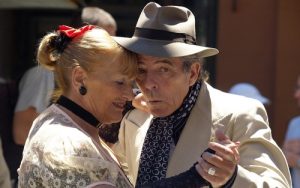In London there is an active nightclub. People are dancing to 50s rockabilly, they are sipping alcohol in flutes, and they are all dressed to the nines. This is not a club for the younger crowd. In fact, it’s an elderly nightclub, through really the party is happening at 2 PM. The average age is 60-years-old, most are much older.

Elderly Nightclub
The club, called The Posh Club, holds weekly cabaret-style parties for seniors for only 5 dollars a person. The club puts the disjointed hip in hipster. Often there are crutches and walking sticks left by the dance floor. This club and a few others are trying to reinvent the idea of older people being social. It’s no longer just sitting around quietly. It’s supposed to be fun.
Producer Dicky Eaton loves being part of The Posh Club. He says the club is really an anti-loneliness campaign presented as a club. He says:
“A lot of our guests maybe don’t get out as much as they once did and don’t see friends as often. Well, this provides a unique way to do both, while also being part of something that’s vibrant and exciting. Just because you reach a certain age, doesn’t mean you don’t want to have fun anymore.”
Like it’s been said before, loneliness is a huge problem for seniors. They are often overlooked and alone. This club reminds the world that older people want to have fun.
How The Posh Club Happened
The Posh Club founders are Simon Casson and his sister Annie Bowden. Their mom moved to a new town and was feeling lonely. To cheer her up, the siblings threw a vintage tea party in her living room. They invited neighbors, who were both in their 90s, and served food while playing a 1940s records.
The ladies loved it so much that Casson and Bowden did it again. This time though, they went bigger. They held it in a local church hall and invited older people from all over town. They decorated the hall, got more records, and even convinced some friends to be waiters. Thus, The Posh Club was born.
What’s the Future of This Elderly Nightclub?
They have expanded the club in five locations. The funding is tight, it’s run as a social enterprise subsidized by grants. They hope to open more clubs because many people have said that they wish there was one where they lived.
Read more here.

